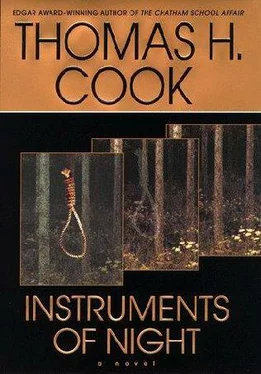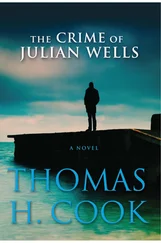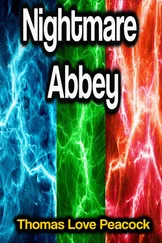Thomas Cook - Instruments of Night
Здесь есть возможность читать онлайн «Thomas Cook - Instruments of Night» весь текст электронной книги совершенно бесплатно (целиком полную версию без сокращений). В некоторых случаях можно слушать аудио, скачать через торрент в формате fb2 и присутствует краткое содержание. Жанр: Триллер, на английском языке. Описание произведения, (предисловие) а так же отзывы посетителей доступны на портале библиотеки ЛибКат.
- Название:Instruments of Night
- Автор:
- Жанр:
- Год:неизвестен
- ISBN:нет данных
- Рейтинг книги:3 / 5. Голосов: 1
-
Избранное:Добавить в избранное
- Отзывы:
-
Ваша оценка:
- 60
- 1
- 2
- 3
- 4
- 5
Instruments of Night: краткое содержание, описание и аннотация
Предлагаем к чтению аннотацию, описание, краткое содержание или предисловие (зависит от того, что написал сам автор книги «Instruments of Night»). Если вы не нашли необходимую информацию о книге — напишите в комментариях, мы постараемся отыскать её.
Instruments of Night — читать онлайн бесплатно полную книгу (весь текст) целиком
Ниже представлен текст книги, разбитый по страницам. Система сохранения места последней прочитанной страницы, позволяет с удобством читать онлайн бесплатно книгу «Instruments of Night», без необходимости каждый раз заново искать на чём Вы остановились. Поставьте закладку, и сможете в любой момент перейти на страницу, на которой закончили чтение.
Интервал:
Закладка:
Suddenly Graves heard a voice in his mind. It was not one he’d ever actually heard, but he recognized it instantly. The voice his imagination had given Faye Harrison, small, trusting, betrayed, Remember me.
An aching in the air swept toward Graves. He saw her step out of the deep summer night, glimmer eerily in her pale blue dress, then withdraw into the shadows once again, leaving nothing but her whisper in the air, Remember me.
“Faye,” he said.
“What is it?” Eleanor asked softly.
Graves recalled the photograph Portman had studied so intently on that last day of his life. He could feel his imagination heating up, driving him beyond the plodding, investigative methods he’d previously relied upon, returning him to Slovak’s passionate and uncertain ways.
“What are you thinking, Paul?” Eleanor demanded.
He glanced toward the woods, and she was there again. At the edge of the trail, the nightbound forest like a black wall behind her. She was staring at him imploringly, translucent and slowly undulating, as if mirrored by dark water. Graves could see the desolation in her face, hear her voice, scarcely audible above the whisper of the leaves, Oh, please, please, please…
“Faye,” Graves said again. In the distance he saw her swiftly turn and head up the trail, her body dissolving into the green filament of the forest wall. “She was in such pain,” he said.
Eleanor took his arm and urged him forward protectively, leading him away from a precipice she could not entirely see. “What about her pain?” she asked.
As they walked toward the gazebo, Graves could feel all the things he’d learned in the past few days whirl wildly in his mind, a maelstrom of memories and images, real and imagined. He knew that they were gathering together as they did in Slovak’s mind, twisting and turning, a pattern emerging from the roiling mass. The white frame of the gazebo glowed softly in the hazy light, red roses drooping heavily in the summer air.
“She was crying,” he said. “That’s why she hid her face when she crossed the lawn that morning.”
Eleanor said nothing, but only continued to guide him forward, her arm still delicately encircling his. They reached the gazebo.
“She knew what Warren Davies had done to her,” Graves said. He could feel his mind gathering bits of information, desperately working to arrange the images even as they flooded in. “She knew, but she hadn’t told anyone.” He stopped, now locked in a furious concentration, his mind like a steaming chamber, hot mists spewing everywhere. “So no one knew why.” As if it were a small animal trained by another, his hand entered his pocket, drew out the letter Mrs. Harrison had written to Allison Davies. “Why, Faye?” he asked as he handed it to Eleanor.
She read it slowly, by the faded light that swept out from the gazebo, meticulously going over each word. When she’d finished it, she looked up and said, “Mrs. Harrison was an English teacher, you said. From the old school. A stickler for grammar, punctuation.” She pressed the letter toward Graves, her finger indicating the question Graves had just repeated: Why, Faye? “It’s the comma that doesn’t fit. A comma signals direct address. Airs. Harrison isn’t asking ‘Why Faye?’ That is, why, of all the girls on earth, it had to be Faye who was murdered. Her question isn’t directed to God or fate or anything like that. It’s directed to Faye herself. She isn’t asking who killed Faye. She’s not looking for a murderer.” Her eyes widened. “She’s looking for a… reason. A reason why Faye went into the woods.”
“Yes.” Graves sensed Slovak at his side, urging him onward invisibly, probing the thing that didn’t fit-slight as a comma-demanding that he let his imagination take the reins. He drew the letter from Eleanor’s hand, read it again, this time studying it as Slovak would study a murder room, not the bloody tapestry, but some small element within it, the odd crease on the murder bed. “The mystery of my daughter’s death.” Another piece slid into place. “Someone from Riverwood,” he said. “Portman knew it was someone from Riverwood who killed Faye.”
Eleanor shook her head. “But we’ve gone over all that. No one from Riverwood could have done it.”
Portman’s words emerged from the maelstrom.
“She went into the woods,” Graves said as the dying Portman had. “Alone.”
Eleanor peered at him quizzically. “Well, she did go into the woods, Paul. Faye, I mean. And she went alone.”
Graves considered Portman’s words again. And suddenly an answer came to him. A shift in perspective. It was like something bestowed upon him. Unexpected. Undeserved.
“In all the names Portman gathered, all the people whose alibis he checked and rechecked, only one person from Riverwood was missing. But we never noticed it. It was hidden by not being hidden.” He saw a figure move up Mohonk Trail, following its narrow path around Indian Rock, then downward, toward the river, plunging through the dense summer growth, breathing in sharp, painful gasps. “She went into the woods,” he said again. He felt the ache in her legs, the emptiness in her stomach. But more than anything, he felt dread like a snarling dog at her heels, driving her forward with a terrible relentlessness until she’d finally broken through the jungle thickness, glimpsed a hint of light blue shifting silently behind a curtain of verdant green. “Mrs. Harrison,” he said. “That’s who Portman meant. That Mrs. Harrison went into the woods. Alone. Not Faye. But her mother.”
He recalled the gray room in which he’d found Mrs. Harrison days before, its walls blank except for the images of Mary and her murdered son, her voice echoing through the shadowy space that had divided them, Some souls will never be at peace. He saw her hair like a silver aurora around her face, the blue eyes glistening as she stared at him. Because they’ve done something terrible. Her lips trembled as she mouthed the final word: Murder.
Graves pulled his mind back to the present, the white trellis of the gazebo, the almost sickening aroma of the roses. For a moment he peered at the basement door, half expecting to see Faye emerge from it, to make her way toward the woods. But the door remained closed. And so, he felt his eyes rise toward the second floor, moving from one window to the next, finding nothing but darkness.
Then Faye’s voice sounded in his mind again. Remember me. He saw her lift her head toward the second floor, her eyes shifting from one window to the next, then to the spaces in between them, the crest of Riverwood, oval of vines carved into the wood, crests that now seemed to hang from the side of the house, looped and coiled.
“The missing rope,” Graves said.
He felt not his own eyes staring at the design, but Faye’s, fixed upon it, her mind sunk in its own dark and airless chamber, tormented and betrayed, all she had once trusted gone to rot. How painfully Andre Grossman’s words must have pierced her, If you live you will live to tell it. If you die, your body will tell it for you.
To live would mean that it would all be revealed, Graves realized suddenly. To live would mean the ruin of Riverwood, of the Davieses, whom she admired, of Allison, whom she loved.
“The rope came from the basement,” Graves said. “When Edward and Mona came back to the boathouse that afternoon, the rope that was used to moor the boat was missing. It was there when they left, but it was gone when they returned. Someone took it.” He saw Faye at the entrance to the corridor, waiting silently as the boat drifted out of the boathouse, Edward standing at the helm, Mona beneath the white umbrella. “Faye went into the boathouse after Edward and Mona left. She took the rope that had been used to moor their boat. She put it in the pocket of her dress and took it with her into the woods. The same rope Mrs. Harrison later found coiled around her daughter’s neck, and which she either hid somewhere or threw in the river.”
Читать дальшеИнтервал:
Закладка:
Похожие книги на «Instruments of Night»
Представляем Вашему вниманию похожие книги на «Instruments of Night» списком для выбора. Мы отобрали схожую по названию и смыслу литературу в надежде предоставить читателям больше вариантов отыскать новые, интересные, ещё непрочитанные произведения.
Обсуждение, отзывы о книге «Instruments of Night» и просто собственные мнения читателей. Оставьте ваши комментарии, напишите, что Вы думаете о произведении, его смысле или главных героях. Укажите что конкретно понравилось, а что нет, и почему Вы так считаете.












